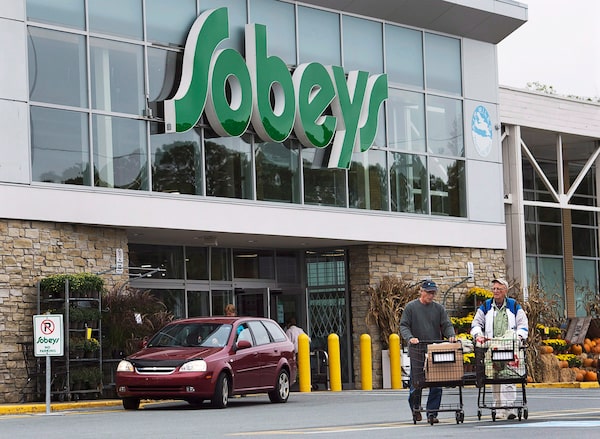
A Sobeys grocery store in Halifax. Its parent company, Empire Company Ltd., reported net earnings of $178.5-million in the quarter.Andrew Vaughan/The Canadian Press
Canadians are making “harder choices” about how to spend their money as food prices continue to soar, the chief executive officer of Sobeys’ parent company said on Wednesday – and requests from suppliers for more cost increases have not abated.
“We’ve gone through another intense period with copious cost increases being brought forward in a short time, and have managed through it well with our supplier partners,” Empire Company Ltd. EMP-A-T chief executive Michael Medline said during a conference call to discuss the company’s fourth-quarter earnings. “… We’re cognizant that customers simply won’t, and often cannot, accept cost increases at some of the extreme levels we’re seeing, while also paying more at the pump and for other essentials.”
Like other grocers, Empire has seen buying behaviours shift, with customers visiting its FreshCo discount banner more often than they were a year ago, along with “trading down” by buying cheaper private-label products, or opting for chicken in place of beef, for example. Impulse purchases are also down, according to executives.
The grocer, based in Stellarton, N.S., reported earnings on the same day that Statistics Canada released the latest inflation numbers, showing that grocery prices rose by 9.7 per cent in May compared with a year ago, and matching the increase reported for April. Fresh vegetable prices rose by 10.3 per cent in May, while meat prices rose by 9 per cent. Rising prices for cooking oils drove a record 30-per-cent overall increase in the cost of edible fats and oils, according to the report. In a survey conducted from mid-April to early May, Canadians reported to Statistics Canada that food prices are affecting them more than rising prices in any other category.
“People only have so much money. … They have to make harder choices,” Mr. Medline said, stressing that the higher profit margins the grocer reported – excluding the effects of fuel – were a result of operational improvements at the retailer and not due to inflation. “We neither like, nor profit from when inflation is at these high levels,” he said.
Empire saw both sales and profits increase in the fourth quarter. The company reported net earnings of $178.5-million or 68 cents a share in the quarter, compared with $171.9-million or 64 cents a share in the same period last year.
The company announced a 10-per-cent increase to its quarterly dividend paid to shareholders, to 16.5 cents a share.
Empire’s results were positively affected by the fiscal calendar, which included an extra week in the quarter compared with the prior year. Sales rose by 13.3 per cent to $7.8-billion in the 14 weeks ended May 7, compared with $6.9-billion in the 13-week period in 2021. Excluding the impact of the extra week, sales rose by 5.2 per cent. Same-store sales – an important metric that tracks sales not affected by new store openings – fell by 2.5 per cent excluding fuel sales.
In addition to inflationary pressures and increased fuel sales, Empire’s total sales benefited from the acquisition of the Longo’s grocery chain last year, the expansion of its Farm Boy and discount FreshCo banners, and the progress of its three-year Project Horizon plan.
That plan, which has now completed its second year, is on track to add $500-million in annualized earnings before interest, taxes, depreciation and amortization (EBITDA) within the next fiscal year, the company reported. As part of Project Horizon, Empire has expanded and renovated stores, added locations and worked on improving its operations and merchandising. It has also been investing in expanding e-commerce operations and in a new loyalty program for the company.
Earlier this month, Empire announced it was dropping the Air Miles loyalty program at its stores and acquiring a stake in the Scene+ program co-owned by Bank of Nova Scotia and Cineplex Inc. The move is designed to give the company more access to customer data as it rolls out in the months ahead.
The company expects same-store sales to grow in the coming year, though it warned that benefits to its profit margins from Project Horizon may be offset by the rising cost of goods, including fuel, and by changes in the sales mix between its banners.
For the full fiscal year ended May 7, Empire reported net earnings of $745.8-million or $2.80 a share, compared with $701.5-million or $2.60 a share in the prior year. The company’s sales for the full year grew by 6.7 per cent to $30.2-billion. Same-store sales for the year fell by 2.1 per cent excluding fuel, compared with fiscal 2021 when same-store sales rose by 5.6 per cent.
Your time is valuable. Have the Top Business Headlines newsletter conveniently delivered to your inbox in the morning or evening. Sign up today.